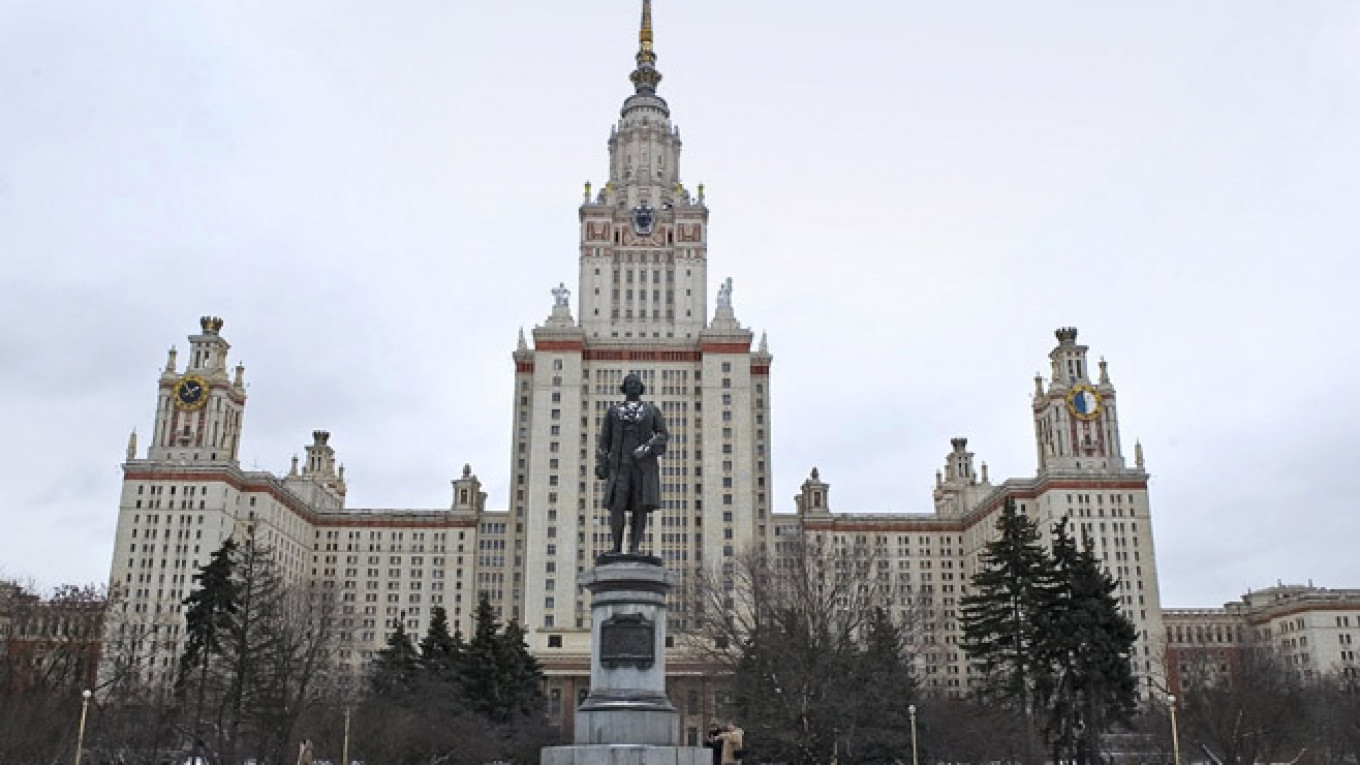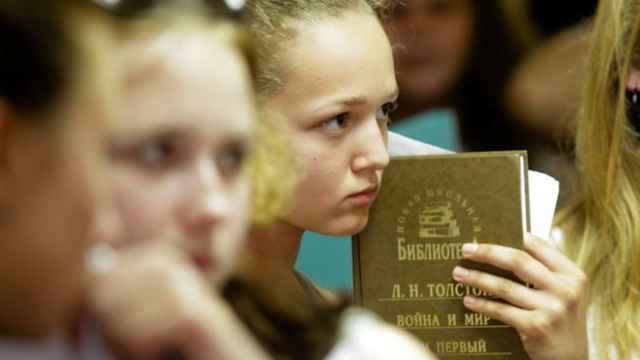For a split second in December, it looked like 77 percent of Russians would be forced out of their current jobs.
This is the estimated percentage of people working in a field outside of the scope of their university studies — a practice the government wanted to broadly prohibit beginning in 2020.
Officials eventually backtracked, but the story highlights Russia's chronic issue with a lack of cohesion between the educational system and the job market, according to labor analysts.
The government tried to solve the problem by regulating employers, not universities — an approach derided by experts polled by The Moscow Times.
But a strong joint effort is needed from the business community, universities and the government to ensure that Russia is aware of its labor reserves and manages them well enough to make economic headway in the postindustrial 21st century.
"The labor market has changed, and education needs to follow," said Anatoly Karachinsky of the Russian Union of Industrialists and Entrepreneurs.
No Diploma, No Job
As with most things legislative, it was the Kremlin that got the ball rolling on occupational standards.
Regulating professional requirements was on top of President Vladimir Putin's so-called May decrees, meant to make good on his 2012 campaign promises.
The government followed through with a bill on the issue, which was being quietly readied for a key second reading in the State Duma earlier this month when scandal erupted.
The vaguely worded bill proposed the establishment of a set of mandatory "occupational standards" for state employees starting in 2016, to be extended to the rest of the labor force four years later, according to one of its authors quoted by Kommersant. Among these standards was the requirement that employees have a degree in their field of work.
The list of 800 occupations slated for formalization by the Labor Ministry included the likes of "fisherman," "film producer" and "journalist." The last one would effectively purge most of the The Moscow Times' employees, as well as those of many leading Russian-language news outlets.
No comprehensive nationwide statistics are available, but an online poll conducted by recruiting agency Job.ru in September revealed that only 23 percent of respondents worked in the field of their studies, and another 21 percent worked in "related fields." The study polled 1,290 respondents. It provided no margin of error.
Gleb Lebedev, research director for job search engine HeadHunter.ru, said that about 30 percent of the site's users had educational degrees to match their jobs.
News reports lambasted the idea as a throwback to medieval times, when only guild-certified professionals were permitted to work in a given trade.
Labor Minister Maxim Topilin backpedaled after the scandal broke out, telling the Regnum news agency that a professional education would only be mandatory for certain professions included on the list, not all of them.
The promise, however, remains to be codified. The ministry failed to return a request for comment in time for publication.
Soviet Inertia
Fun fact: Russia has been successfully implementing occupational standards for a decade.
Professional groups within the Russian Union of Industrialists and Entrepreneurs are drafting them based on their own needs and forwarding them to the Education Ministry, which is implementing them in university and vocational school programs.
The lobby group's website lists 153 standards so far, and the list is constantly being expanded and revised, Karachinsky said.
"It really works," said Karachinsky, who heads software development and IT firm IBS Group as his day job.
The practice became necessary as a means of offsetting the conservative mentality of the education system, shaped in Soviet times, he said.
Educational programs left over from planned economies work poorly under capitalism, but the education system has been slow to adapt, said Sergei Smirnov, the head of the Institute of Social Policy and Socio-Economic Programs at the Higher School of Economics.
One typical example was seen in the past in the form of overproduction of industrial workers, which were in high demand within the confines of the isolated Soviet economy, but not on the free market, where many Russian industrial enterprises failed to compete. The teaching industry also continued to crank out the same numbers of specialists despite a demographic slump.
Tellingly, the first ones to draft educational standards were restaurateurs, beating even the IT industry — a reflection of the Soviet era's notoriously absent customer-service culture.
Fixing What's Not Broken
What the officials did was try to impose occupational standards on employers, not educators, said higher education expert Pyotr Safronov of the Russian State University of Humanities.
Karachinsky of the Russian Union of Industrialists and Entrepreneurs described the attempt in words unfit for publication.
His union's effort alone is too haphazard to produce a comprehensive nationwide system of occupational standards, Safronov said.
And such a system is needed to ensure Russian vocational schools and universities train the professionals that the country needs, experts agreed.
"The occupational standards are a desperate measure, a club with which employers can beat out minimum-quality specialists from the educational system," Safronov said.
The practice is well known throughout the world: Britain, for example, has an elaborate system for matching skills to the market, centered around the employer-led "sector skills councils."
But only in Russia have the bureaucrats tried to regulate the labor market themselves instead of letting businesses and universities take the lead, said Smirnov of the Higher School of Economics.
Labor Market Haze
Russian universities and vocational schools churned out 2.7 million graduates in 2012, according to the State Statistics Service. But no one seems to know for certain whether these young diploma holders are needed by the market.
It has become a truism that Russia produces too many financiers and lawyers, while it lacks adequate supplies of blue-collar workers and engineers.
But confirming the claim is hard, as the country has no comprehensive system of tracking its labor resources or graduates' employment.
Economy, humanities and architecture/construction were the most popular university specializations as of 2012, the latest year for which disjointed official figures are available.
In vocational schools, economists topped the list as well, followed by healthcare and metal workers.
The State Statistics Service said in 2012 demand was highest for healthcare professionals at all levels, as well as qualified manufacturing workers — and, oddly, real estate agents.
But Lebedev of HeadHunter.ru said most job vacancies were posted for sales and administration personnel, as well as for highly skilled proletarian trades.
Healthcare jobs were not as prominent, he said, citing as proof the ongoing staff cuts at state hospitals in Moscow.
And students themselves believed banking and investment were the most in-demand fields in Russia, trailed by — again — health care and industrial technology, according to a 2012 study by VTsIOM.
But given the low correlation between education and field of employment cited above, this may indicate that students simply do not know what professions they should be mastering.
A job market forecast by the Labor Ministry, published in November, added confusion by predicting employment by 2017 to drop in agriculture, manufacturing and education and increase in sales and transportation.
Labor Imbalance
Two important factors distorting the labor market in Russia are geographical imbalance and low industrial output in a country making a living from oil extraction, experts said.
"Sales jobs are prominent because our economy is dominated by sales, not industrial production," said Lebedev of HeadHunter.ru.
And the workforce is gravitating toward the two mega-hubs of Moscow and St. Petersburg, said Safronov of the Russian State University of Humanities.
As a result, employers in these two cities have no need for educational standards because they can cherry-pick, said the expert, who also teaches at the Higher School of Economics.
In the rest of the country, businesses have to make do with what meager labor force is available, and cannot afford to be choosy, Safronov said.
All Together Now
To set the labor market straight, every stakeholder in a burgeoning specialist's future should brush up their act, experts said.
The government must comprehensively study and monitor the country's labor resources, including availability and demand, entrepreneur Karachinsky said.
The Labor Ministry runs a closed labor resources forecasting system and publishes pithy predictions on the matter. But this is nowhere near sufficient, Karachinsky said.
Business needs to pull off a more thorough and organized effort in drawing up standards and getting them directly to schools and universities, Safronov said.
And educators need to be more responsive in adapting their programs to actual demand in the labor force, as well as do a better job tracking graduates' employment records, Smirnov said.
Even then, the technical progress marches too fast for the education to meet the market's demand's fully and on time, said Smirnov.
"You can't have complete harmony between the education and the market," he said. "But you can narrow the gap."
Contact the author at [email protected]
A Message from The Moscow Times:
Dear readers,
We are facing unprecedented challenges. Russia's Prosecutor General's Office has designated The Moscow Times as an "undesirable" organization, criminalizing our work and putting our staff at risk of prosecution. This follows our earlier unjust labeling as a "foreign agent."
These actions are direct attempts to silence independent journalism in Russia. The authorities claim our work "discredits the decisions of the Russian leadership." We see things differently: we strive to provide accurate, unbiased reporting on Russia.
We, the journalists of The Moscow Times, refuse to be silenced. But to continue our work, we need your help.
Your support, no matter how small, makes a world of difference. If you can, please support us monthly starting from just $2. It's quick to set up, and every contribution makes a significant impact.
By supporting The Moscow Times, you're defending open, independent journalism in the face of repression. Thank you for standing with us.
Remind me later.







